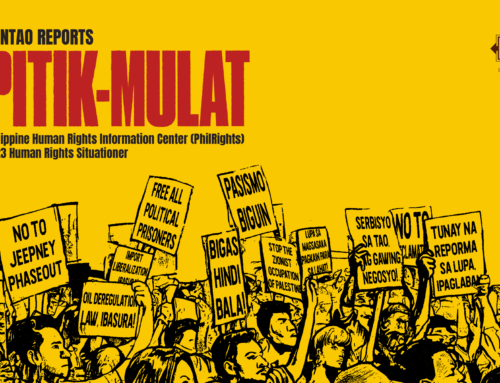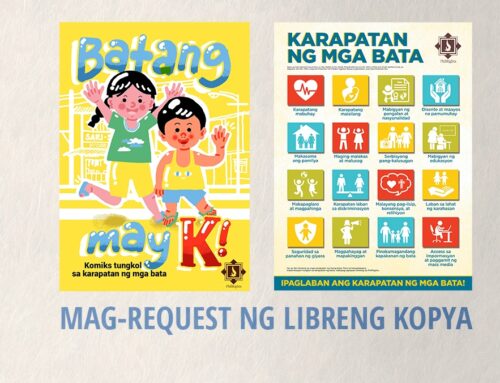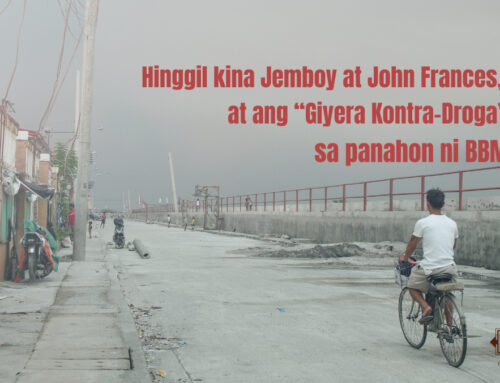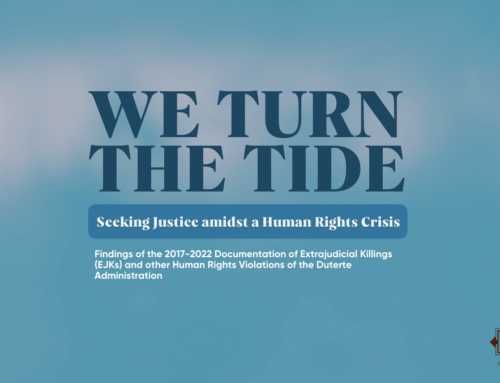We, the organisations named below, make this statement to express our serious alarm about the widespread arbitrary arrests of children taking place throughout the Philippines under the ‘Oplan Tambay’ project of the Philippine government.
We note that President Duterte issued a directive that children found loitering be arrested for their protection, even if they have not committed any crime.(1) We further note that in the execution of Oplan Tambay in Cebu Province, minors violating curfew ordinances have been the largest group arrested.(2) We note that in the City of Manila, there is a drive to achieve ‘zero street children’ which is leading to large numbers of children being arbitrarily removed from public spaces.(3)
While we acknowledge that the intention of such policies may be to protect children, there are various reasons why these actions raise serious alarm for us:
1. Criminalization
Ordering police officers or barangay officials to take children into custody puts them into contact with the criminal justice system. This process of criminalising children can have an extremely detrimental effect, impacting on all aspects of their development and ultimately lead to life outcomes that are more negative than their presence on the street may otherwise have led to.
2. Symptomatic Approach
Simply removing children from the street fails to address the symptoms of why they are on the street in the first place. Effective programs should aim to address structural inequalities and push/pull factors that lead children to the street including unemployment, lack of housing, inflation, corruption, domestic violence and inadequate social protection systems.
3. Inadequate Safeguards in Place
There are insufficient safeguards in place to ensure that children taken into custody by law enforcement officials are appropriately protected. This leaves children extremely vulnerable to abuse, exploitation and even trafficking. Officials working directly with children should be adequately trained and supervised. There should be effective and transparent monitoring systems in place as well as independent complaints mechanisms for children and families.
4. Violence and Abuse
Evidence-based data has established that a significant majority of children who are ‘rescued’ from the street in the Philippines experience violence at the hands of their ‘rescuers’ and law enforcement officials.(4) This is also evidenced by media coverage of Oplan Tambay.(5) Children also report serious instances of abuse and violence perpetrated within government shelters. Oplan Tambay has insufficient protections in place to ensure that children are not physically, sexually or emotionally abused during the process of taking them into custody. There are also vastly insufficient resources available to meet the needs of children being taken into custody.
5. Inadequate Facilities
Government facilities used to shelter children who are taken into custody frequently do not meet the minimum legal requirements for shelters, are seriously overcrowded, understaffed and ill-equipped to meet the needs of children.(6) Housing children in shelters that are below standard, even on a short-term basis, risks exposing them to abuse, trauma and neglect.
6. Violates Philippine Laws and Policies
There are various Philippine laws and policies governing how children are to be taken into protective custody.(7) These guidelines were established after it was demonstrated that many ‘rescue’ operations by government officials were involuntary, indiscriminate, harmful and ineffective. The execution of Oplan Tambay does not abide by the guidelines set out in these various policy documents.
7. Violation of Children’s Rights
The Philippines is a signatory to the UN Convention on the Rights of the Child and is legally bound to uphold children’s rights, including the right to freedom from arbitrary deprivation of liberty and the right to recovery and social reintegration of victims of neglect, abuse or exploitation.(8) Recognising the discrimination implicit in round-ups of children in street situations, the recent UNCRC General Comment 21 in relation to Children in Street Situations specifically calls on State Parties to ‘abolish any provisions allowing or supporting the round-up or arbitrary removal of children and their families from the streets or public spaces’.(9) The General Comment calls on the Philippine government to implement a rights-based approach to dealing with children in street situations, in which the process is as important as the end result. Moreover, the General Comment 10 on Children’s Rights in Juvenile Justice ‘recommends that the States parties abolish the provisions on status offences’ and further states that ‘behaviour such as vagrancy, roaming the streets or runaways should be dealt with through the implementation of child protective measures, including effective support for parents and/or other caregivers and measures which address the root causes of this behaviour’(10).
Accordingly, we call on the Philippine government to
IMMEDIATELY STOP THE ARBITRARY ARREST OF CHILDREN AND FAMILIES FROM STREETS AND PUBLIC SPACES.
We further call on the government to:
1. Arrange the immediate release of any children held in custody without prior authority or in conditions that pose a threat to their health, safety or wellbeing.
2. Establish an independent complaints mechanism to allow children or their families or legal guardians to raise concerns about their custody.
3. Require that all facilities, government and non-government, that are sheltering children meet the minimum standards for Department of Social Welfare and Development’s accreditation.
4. Hasten the re-establishment of the National Network for Street Children and the development of a National Plan of Action for Children in Street Situations.
SIGNED on this 3rd day of July 2018 by:
Action for the Care and Development of the Poor in the Philippines (ACAP)
Amaya Lay in Mindanao Inc (ALAY)
Ateneo de Davao Legal Aid
Bahay Tuluyan Foundation Inc
Child Alert Mindanao
CHILDInitiative
Children’s Legal Rights and Development Center (CLRDC)
Coalition Against Summary Execution (CASE)
Gitib Incorporated
In Defense of Human Rights and Dignity Movement (iDEFEND)
KALITAWHAN Network
Katilingban Para sa Kalambuan Inc (KKI)
National Council for Social Development
Network Against Killings in the Philippines (NAKPhil)
PETA ARTS Zone Project
Philippine Alliance of Human Rights Advocates (PAHRA)
Philippine Human Rights Information Center (PhilRights)
Pinag-Isang Lakas ng Kabataan (PILAK)
Rise up for Life and For Rights
Salinlahi Alliance for Children’s Concerns
Tambayan Center for Children’s Rights Inc
For further information, please contact Bahay Tuluyan at info@bahaytuluyan.org or (02) 353 2350.
___________________________________
FOOTNOTES:
(1) http://newsinfo.inquirer.net/1004226/breaking-duterte-wants-arrest-of-loitering-minors
(3) https://www.facebook.com/gmanews/videos/10156614816961977/?t=2
(4) Sagip or Huli? Rescue of Street Children in Caloocan, Manila, Pasay and Quezon Cities, UNICEF, 2009
(5) See for example https://www.facebook.com/gmanews/videos/10156614816961977/?t=2 and https://twitter.com/TVPatrol/status/1011557968830058496
(6) See for instance https://www.rappler.com/move-ph/issues/hunger/81031-rac-closure-dswd
(7) Especially sections 57 and 57-A of RA 9344 as amended by RA 10630, which provides that children cannot be held liable for status offenses, RA 10158 which decriminalized vagrancy and the Supreme Court decision in SPARK v Quezon City, GR No. 225442, August 8, 2017 which invalidated curfew ordinances for minors which provide for their arrest and welfare. Also DSWD AO 08, series of 2009 and CWC Protocol to Reach Out to Street Children
(8) See especially articles 37, 39 and 40 of the UNCRC, paragraphs 78 and 79 of UNCRC General Comment No. 10 on Children’s Rights in Juvenile Justice
(9) Paragraph 14, UNCRC General Comment No. 21 on Children in Street Situations
(10) Paragraphs 8 and 9, UNCRC General Comment No. 10 on Children’s Rights in Juvenile Justice








